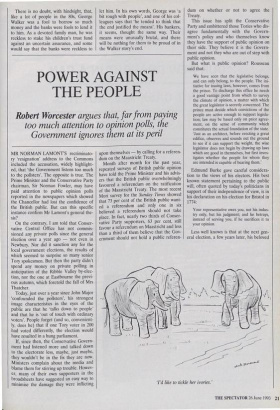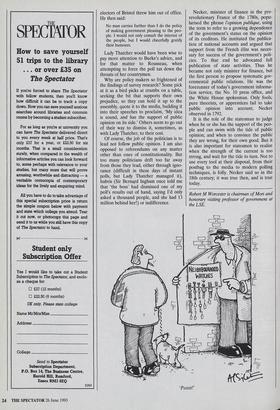POWER AGAINST THE PEOPLE
Robert Worcester argues that, far from paying
too much attention to opinion polls, the Government ignores them at its peril
MR NORMAN LAMONT'S recriminato- ry 'resignation' address to the Commons included the accusation, widely highlight- ed, that 'the Government listens too much to the pollsters'. The opposite is true. The Prime Minister and the Conservative Party chairman, Sir Norman Fowler, may have paid attention to public opinion polls reported in the newspapers which showed the Chancellor had lost the confidence of the British public. But can this specific instance confirm Mr Lamont's general the- sis?
On the contrary, I am told that Conser- vative Central Office has not commis- sioned any private polls since the general election over a year ago — not even in Newbury. Nor did it sanction any for the local government elections, the results of which seemed to surprise so many senior Tory spokesmen. But then the party didn't spend any money on private polling in anticipation of the Ribble Valley by-elec- tion, nor the one at Eastbourne the previ- ous autumn, which foretold the fall of Mrs Thatcher.
Today, just over a year since John Major `confounded the pollsters', his strongest image characteristics in the eyes of the public are that he 'talks down to people' and that he is 'out of touch with ordinary voters'. People forget (and so, convenient- ly, does he) that if one Tory voter in 200 had voted differently, the election would have resulted in a hung parliament.
If, since then, the Conservative Govern- ment had listened more and talked down to the electorate less, maybe, just maybe, they wouldn't be in the fix they are now. Ministers complain about the media and blame them for stirring up trouble. Howev- er, many of their own supporters in the broadsheets have suggested an easy way to minimise the damage they were inflicting upon themselves — by calling for a referen- dum on the Maastricht Treaty.
Month after month for the past year, repeated surveys of British public opinion have told the Prime Minister and his advis- ers that the British public overwhelmingly favoured a referendum on the ratification of the Maastricht Treaty. The most recent Mori survey for the Sunday Times showed that 73 per cent of the British public want- ed a referendum and only one in six believed a referendum should not take place. In fact, nearly two thirds of Conser- vative Party supporters, 63 per cent, still favour a referendum on Maastricht and less than a third of them believe that the Gov- ernment should not hold a public referen-
dum on whether or not to agree the Treaty.
This issue has split the Conservative Party and embittered those Tories who dis- agree fundamentally with the Govern- ment's policy and who themselves know they have the support of public opinion on their side. They believe it is the Govern- ment and not they who are out of step with public opinion.
But what is public opinion? Rousseau said that:
We have seen that the legislative belongs, and can only belong, to the people. The ini- tiative for issuing laws, however, comes from the prince. To discharge this office he needs a good vantage point from which to survey the climate of opinion, a matter with which the great legislator is secretly concerned. The prince must decide which convictions of the people are active enough to support legisla- tion; law may be based only on prior agree- ment, on the sense of community which constitutes the actual foundation of the state. `Just as an architect, before erecting a great edifice, observes and sounds out the ground to see if it can support the weight, the wise legislator does not begin by drawing up laws which are good in themselves, but first inves- tigates whether the people for whom they are intended is capable of bearing them.'
Edmund Burke gave careful considera- tion to the views of his electors. His best known statement pertaining to the public will, often quoted by today's politicians in support of their independence of view, is in his declaration on his election for Bristol in 1774:
Your representative owes you, not his indus- try only, but his judgment; and he betrays, instead of serving you, if he sacrifices it to your opinion.
Less well known is that at the next gen- eral election, a few years later, his beloved
`I'd like to tickle her ivories.'
electors of Bristol threw him out of office. He then said:
No man carries further than I do the policy of making government pleasing to the peo- ple. I would not only consult the interest of the people, but I would cheerfully gratify their humours.
Lady Thatcher would have been wise to pay more attention to Burke's advice, and for that matter to Rousseau, when attempting to force the poll tax down the throats of her countrymen.
Why are policy makers so frightened of the findings of survey research? Some pick at it as a bird picks at crumbs on a table, seeking the bit that supports their own prejudice, so they can hold it up to the assembly, quote it to the media, building it into their speeches to proclaim, 'My idea is sound, and has the support of public opinion on its side.' Others seem to go out of their way to dismiss it, sometimes, as with Lady Thatcher, to their cost.
Of course, the job of the politician is to lead not follow public opinion. I am also opposed to referendums on any matter other than ones of constitutionality. But too many politicians drift too far away from those they lead, either through igno- rance (difficult in these days of instant polls, but Lady Thatcher managed it), hubris (Sir Bernard Ingham once told me that 'the boss' had dismissed one of my poll's results out of hand, saying I'd only asked a thousand people, and she had 13 million behind her!) or indifference. Necker, minister of finance in the pre- revolutionary France of the 1780s, popu- larised the phrase Popinion publique, using the term to refer to a growing dependence of the government's status on the opinion of its creditors. He instituted the publica- tion of national accounts and argued that support from the French elite was neces- sary for success of the government's poli- cies. To that end he advocated full publication of state activities. Thus he became not only minister for finance, but the first person to propose systematic gov- ernmental public relations. He was the forerunner of today's government informa- tion service, the No. 10 press office, and the White House spokesman. Only fools, pure theorists, or apprentices fail to take public opinion into account, Necker observed in 1792.
It is the role of the statesman to judge when he or she has the support of the peo- ple and can swim with the tide of public opinion; and when to convince the public they are wrong, for their own good. But it is also important for statesmen to realise when the strength of the current is too strong, and wait for the tide to turn. Not to use every tool at their disposal, from their postbag to the media to modern polling techniques, is folly. Necker said so in the 18th century; it was true then, and is true today.
Robert M Worcester is chairman of Mori and honorary visiting professor of government at the LSE.
Tsssst!'



























































 Previous page
Previous page